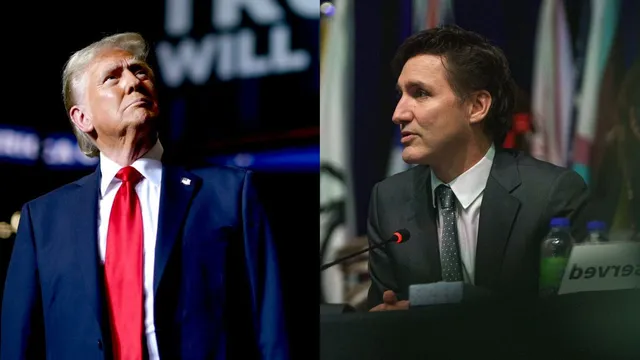- By Ajeet Kumar
- Sun, 02 Feb 2025 10:16 PM (IST)
- Source:JND
US-Canada trade war: A war of words between Donald Trump and Canadian Prime Minister Justin Trudeau triggered even before the Republican leader came into power. Trump mocked Trudeau on multiple occasions-- asking him to become the Governor of the 51st state of the US. Now, Trump returned to the White House and his election speeches are turning to executive orders. On Sunday, Trump ordered tariffs of 25 per cent on Canadian and Mexican imports and 10 per cent on Chinese goods starting on Tuesday to address what he calls a national emergency of fentanyl and illegal immigration pouring into the United States.
In retaliation, Mexico and Canada, the top two US trading partners, immediately vowed counter-tariffs, while China said it would challenge Trump's move at the World Trade Organization and take other "countermeasures".
— Donald J. Trump (@realDonaldTrump) February 1, 2025
Trudeau's emotional message to Canadians
Trudeau said that Canadian duties on USD 30 billion in trade in American alcohol and fruit will take effect Tuesday when the US tariffs go into effect.
"I’m sure many of you are anxious, but I want you to know we are all in this together. The Canadian government, Canadian businesses, Canadian organised labour, Canadian civil society, Canada's premiers and tens of millions of Canadians from coast to coast to coast are aligned and united. This is Team Canada at its best," Trudeau said in an emotional message to the Canadians.
Later in a post, Trudeau appealed the Canadians to check the label before purchasing any products-- a step to endorse the domestic market and discourage the US products. "Now is the time to choose products made right here in Canada. Check the labels. Let’s do our part. Wherever we can choose Canada," Trudeau said in an X post.
Now is the time to choose products made right here in Canada.
— Justin Trudeau (@JustinTrudeau) February 2, 2025
Check the labels. Let’s do our part. Wherever we can, choose Canada.
Is America stuck in a trade war?
Trump once famously posted on social media that "trade wars are good and easy to win"-- a claim that he's now putting to the test against Canada and Mexico after imposing tariffs that within hours led to retaliatory measures by those two countries. He said the tariffs are about stopping the illicit smuggling of fentanyl, as well as preventing illegal immigration on the US borders with Mexico and Canada.
Those moves almost immediately angered Mexico and Canada, America's two largest trading partners who had previously negotiated a deal with Trump during his first term. Both levied retaliatory tariffs. Hockey fans at the Ottawa Senators game in Canada booed the US national anthem. The Canadian prime minister encouraged his citizens to buy Canadian.
They are up against a US president who really loves tariffs. He is already promising more import taxes on computer chips, steel, copper, pharmaceutical drugs and the European Union. His administration has yet to explain why these taxes will not worsen the inflation he was elected to fix. The Budget Lab at Yale University estimates Trump’s tariffs would cost the average American household USD1,000 to USD1,200 in annual purchasing power.
What's next for the US and Canada?
Earlier in the day, the Canadian ambassador told ABC News that Ottawa hopes hefty tariffs imposed by Trump will not take effect on Tuesday but the Canadian public expects the government to stand firm in a trade dispute with Washington, Reuters reported.
"I think the Canadian people are going to expect that our government stands firm and stands up for itself. We're not at all interested in escalating, but I think that there will be a very strong demand on our government to make sure that we stand up for the deal that we have struck with the United States," the news agency quoted Ambassador Kirsten Hillman as saying in an interview on the broadcast network.
(With inputs from Agencies)

